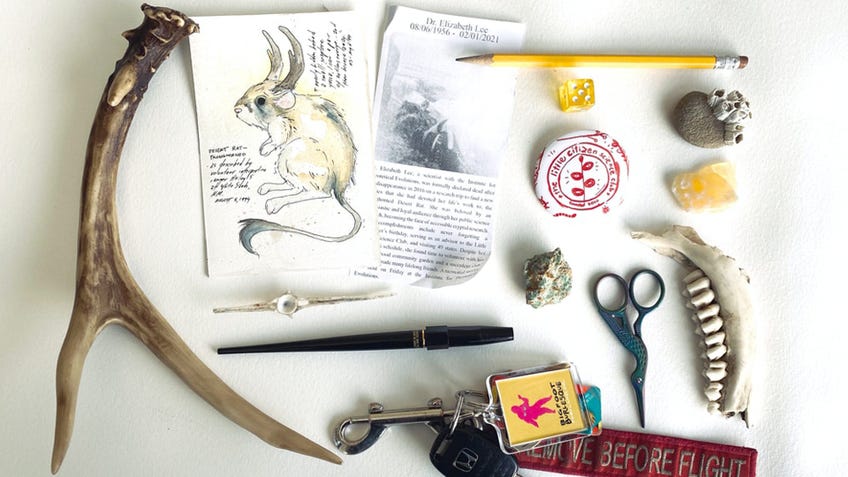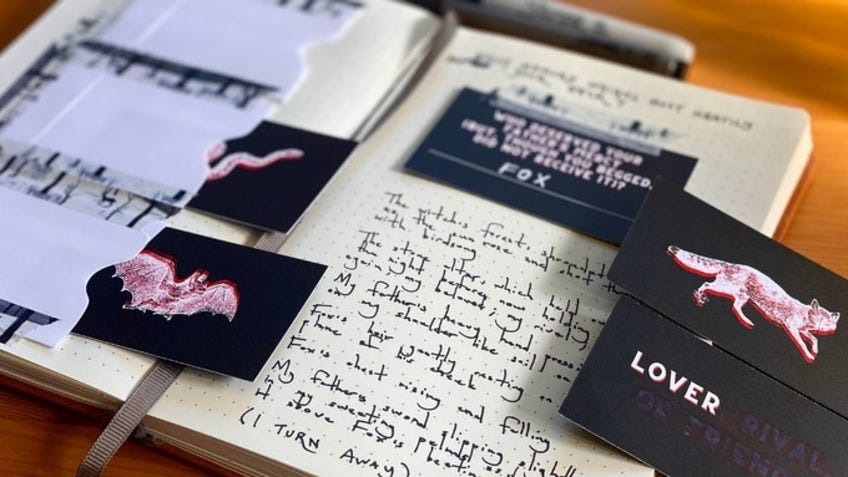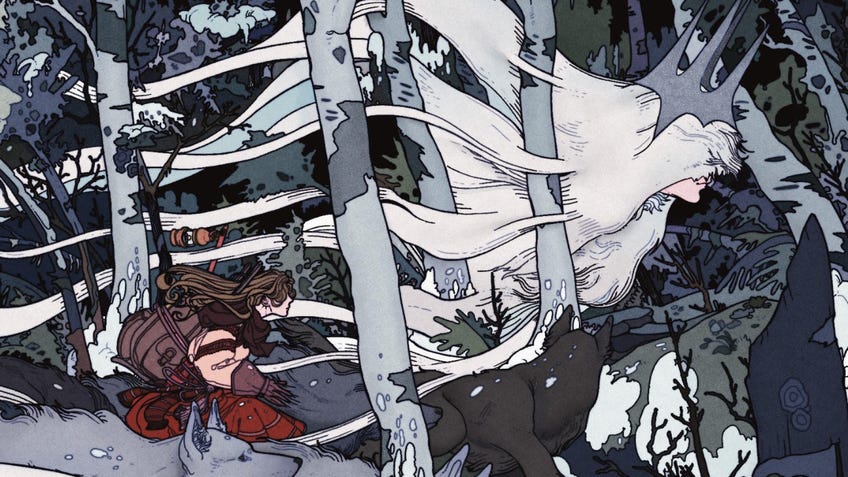Keepsake game designer Jeeyon Shim branches out with chess-based RPG The Snow Queen
The award-winning artist has left Kickstarter behind to build a two-player tragedy focusing on community.
Jeeyon Shim has made a name for herself as a genre trailblazer and steward of some of the most interesting experiences in tabletop RPGs since entering the scene a few years ago. Co-creator of Field Guide to Memory with artist Shing Yin Khor, Shim helped usher in keepsake games that leave the player - or players - with a physical artefact full of sketches, poetry, tchotchkes and emotionally resonant ephemera.
Her newest title, The Snow Queen, represents several bold new directions for the winner of the 2021 Diana Jones Emerging Designer award. Shim was one of many tabletop designers to leave Kickstarter in the wake of the crowdfunding platform’s embrace of blockchain technology, and she has decided to self-publish The Snow Queen on her own website . The campaign for the two-player, chess-based title, which has already raised more than three times its initial ask, has advertised a level of interactivity and flair players have come to expect from Shim.
Dicebreaker sat down with Shim to discuss the move away from Kickstarter, what it means for her future and that of tabletop’s independent designers. She also talked about what makes The Snow Queen a stark departure from her earlier games and how she hopes her audience will follow her into an exciting - if uncertain - future.
This interview has been edited for length and clarity.
What led you to The Snow Queen’s theming and the use of a chess board to play it?
Generally speaking, I have not done a lot of game design that scaffolds on existing systems. I'm not doing a Belonging Outside Belonging game. I'm not doing a Power by the Apocalypse game. It's not a skill that has been super well built up for me. So, this is me practising because my next big project for 2022 or 2023 is The Luminous Door, a 50/50 split between PbtA and my own original system, which I'm calling The Boundless Mirror.
Since I was going to scaffold an existing system, I looked at my game shelf and was like, ‘What games do I have that seem simple enough to pick up quickly? Chess is fine because the moves are very simple, right? There's a lot of variety in them, but the way the pieces move on the board is easy. By the time I realised what a fool I was, it was too late.
It might be slower, and the growth might be more incremental, but I do think that doing stuff independently tends to grow a more thoughtful audience.
I'm very proud of myself that the Snow Queen doesn’t require you to be good at chess because I'm not good at chess. Your goal isn't to play a long game - it's to take as many pieces as you can. Because the more pieces you take, the more story you drive, and the more of a disadvantage your opponent has. It's very straightforward and kind of aggressive. It was inspired by a real life chess player who apparently fucking wiped the floor with a bunch of British and Russian chess players and then just fucked back off to India and was like, ‘Yeah, I'm bored. I don't want to do this anymore.’
A beginner who has never played chess before should be able to play the Snow Queen just as well as someone who is a veteran chess master. If anything, knowing a lot of chess strategy and being good at chess might actually be to your disadvantage because if you're conditioned to try to play that long game your opponent is just gonna take all your shit.
The other thing that really fascinated me was whether I can make this game where the narrative is oppositional but play is cooperative between the players. Hopefully, there will not be bad feelings among the players when the game is over because you just built an amazing story together.

The concept of using conflict as an engine for building a shared story is really fascinating.
I really like making games that have high stakes, but I don't necessarily have a whole lot of experience making games with stark lose conditions. Most of my games don't have lose conditions, like the solo journaling games. There are different outcomes, but they're all satisfying. Here, there's a lose condition, but theoretically it should be just as satisfying as winning.
Your Keepsake games don’t always have defined play lengths or things that trigger the endstate. Did that pose a problem with The Snow Queen?
As the quickstart rules states, it's kind of up to player preference whether they do this until it naturally peters out or if it's timed. But I think I'm going to make a timed game the default. I think that leads to the urgency, and it also means that the keepsake aspect isn't necessarily overwhelming.
I was definitely uncertain and worried, for sure. I'm just so relieved that it funded on day one because I feel a little better about this decision.
The way it works is anytime a piece is taken there is an All is Well outcome versus an All is Lost outcome. The player whose character takes a piece gets to define an All is Well outcome, and the player whose piece is taken defines an All is Lost outcome for that character that the piece represents. Because all the pieces on the board represent NPCs, all the squares on the board represent a place in their community. Every time one of those prompts is triggered by taking a piece, you write it as the heading on a page in your journal, keepsake that you're making. You don't write anything else until the chess match is done, and you just keep doing that until the game is over.
Essentially, this is a creative exercise for people who feel really intimidated by the idea of writing, drawing or poetry. Because the prompts are the titles on each page, you have a limit to what you can write. If you reach the end of the page and it's mid sentence, that's it - that story is unfinished and that lack of closure actually becomes a part of that keepsake experience, as well.
A lot of the prompts in the Snow Queen are very nature based, very land based - the love that these two characters have for their community. It's not just a human community for either of them, which is something that I do try to emphasise in most of my work. When people talk about community, they're just talking about people, but that's a fallacy. Our communities are nonhuman, as well, and that's very much written into the game.
The Snow Queen is your first non-Kickstarter project. What were your expectations heading into the launch?
I didn't know what to expect, honestly. One of the things I like to emphasise - and that my collaborator Shing Yin Khor has brought up, as well - is that independent creative crowdfunding is not new. It's been around since the ancient days of the Internet when social media wasn't really a thing. But people still managed to eke out a living. This format of crowdfunding is, it has both not been like around long enough to be considered gospel by any stretch of the imagination
When people talk about community, they're just talking about people, but that's a fallacy. Our communities are nonhuman, as well, and that's very much written into the game.
In the case of a lot of creative design that we think of within the context of games and book publishing, a lot of it was pioneered by Spike Trotman, who is the founder of Iron Circus comics. I've mentioned her name a lot because I have noticed that people will - within the context of their own knowledge - think they or someone else is being original with their self-funded, independent projects. I want to make sure Spike gets the credit that she's due.
A lot of [self-funded] campaigns are maybe not lost to time, but it's not easy to find them. And it's very hard to even use them to project anything practical, like numbers, ranges of earnings, gross earnings or net earnings. I just can't use anyone who's done this before as a reference for my own projections. So I really feel like I have no map. Even with the people who've done this before, it's only a partial picture of what to expect.
The crowdfunding format that I’m using is different. It's interactive, and there is a demo of the keepsake that people will be making if they play the game built into the crowdfunding page. There's a lot of room for experimentation and play as an experience design, and I'm already thinking about how I could use this for future games. For example, I'm going to be crowdfunding a game called Yearning that uses bird watching as one of the primary mechanics. I've been thinking that I could do a bird of the day - share a little ID guide to a specific kind of bird, say what region it's found in and what its migratory times are. That's possible by virtue of being able to set your own template and choose your own site.

How are you feeling? What’s the emotional state heading into this new venture? Does it feel like a challenge to overcome, or is there a lot of fear?
I've been apprehensive about this process. it wasn't self aggrandisement or bombastic to say my livelihood was on the line with this experiment. The cost I put up on the website is always the breakeven cost for the overhead of the game - my time just making the game, not the full cost of living. I still am not totally out of the woods, but I'm feeling better than I was two days ago when it was a complete unknown.
If I had just made enough to make the game, I would not have been able to pay rent next month. I wouldn't have been able to pay for my own fairly considerable health care costs. I wouldn't be able to pay for veterinary costs, let alone food, internet and phone. So, if you're asking about the emotional landscape, I was definitely uncertain and worried, for sure. I'm just so relieved that it funded on day one because I feel a little better about this decision.
Do you believe your success will help fuel a trend towards more self-publishing in tabletop RPGs?
Realistically, I don't think I could really answer with a yes or no because I'm still figuring out the components of what's working and what's not. I think that measures of success are only useful when you're measuring yourself. But it never hurts to be aware of the spectrum of the industry. Are you a hobbyist, or is this your living? Do you have a safety net?
I'm very proud of myself that the Snow Queen doesn’t require you to be good at chess because I'm not good at chess.
Game design was not something that I went into because it delights me creatively. The fact that it does is great, but that's not why I went into it. I did game design because it was the only other avenue of income that I had at the point in which I had to take furlough and then take a layoff [in 2020]. Going into this industry was for survival, and it continues to be for survival.
Some people might look at The Snow Queen and think, ‘Oh, I can do that.’ Same with John Batts’ stuff, right? But that's very different from ‘Can I make a living on this?’ That's a different question. If I understand the history correctly, a lot of people did not start as game designers because they had to, in order to make a living. They did it because they like tabletop, and it's fun. I think being very self aware and realistic about what success means is a better way to measure viability.
Hopefully, [The Snow Queen] will show people that you can make your own website and people will come to it if you have done certain other things, first. If you have an audience that's interested in you as a creator and your body of work, rather than a Kickstarter follower looking at your project as a product. Another thing is being realistic about your audience. Who are you designing for? Who will switch platforms for you?
Have you thought about returning to Kickstarter in the future, or will self-publishing be your path forward?
Kickstarter isn't your friend. Not the company, but the format of it is not going to help you as an independent creator who wants a career with longevity. It encourages people to put you in a box according to thematic pigeonholes. ‘Oh, they made this kind of game. They're gonna make this kind of game, next.’ That isn't the way that I want to engage with people. That actually kind of freaks me out. Yeah, it brings more people to your project, but are they the people who are going to be thoughtful audience members for a long time? Are they going to stick around for other projects?
It might be slower, and the growth might be more incremental, but I do think that doing stuff independently tends to grow a more thoughtful audience just by virtue of the fact that it's harder to find you if you're on a website. That's the thing that I am building my new business strategy on now that Kickstarter is not an option for me, unless some really radical changes.
There has been a huge rise in the funding of white supremacist groups because blockchain basically makes funding untraceable. It's very hard to find who sends people money, which means suddenly there has been a flourishing of hate groups that actively want me to suffer and die. I would prefer not to contribute to the normalisation of this in any way on a cultural level.



